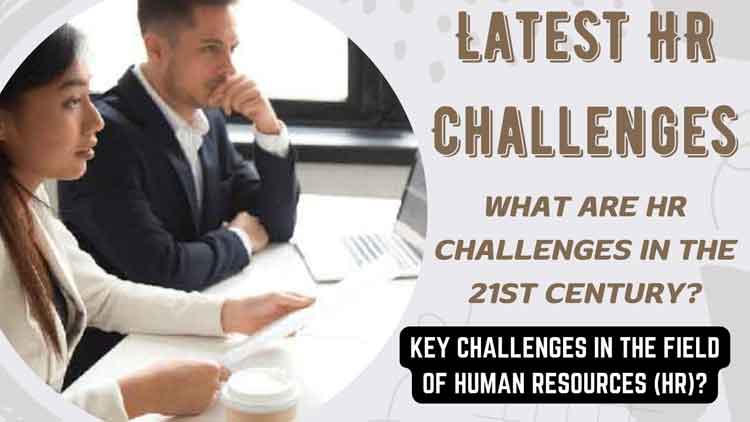Table of Contents
HR Challenges | What are the Key Challenges in the Field of Human Resources (HR)?
The field of Human Resources (HR) grapples with a myriad of challenges that reflect the ever-evolving landscape of the modern workplace. Talent acquisition and retention remain at the forefront, with organizations engaged in a fierce war for skilled professionals. The intricate task of fostering employee engagement and satisfaction to mitigate turnover adds to this complexity.
Rapid technological advancements pose a double-edged sword, necessitating the integration of sophisticated HR technologies while safeguarding the privacy and security of sensitive employee data. Achieving diversity and inclusion is an ongoing struggle, marked by the need to address unconscious biases and create an environment where individuals from diverse backgrounds thrive.
The rise of remote work, accelerated by global events, challenges HR professionals to manage virtual collaboration effectively and maintain workforce well-being in the absence of traditional office structures. Legal complexities further compound HR responsibilities, requiring continuous adaptation to changing employment laws and global compliance standards.
Leadership development and succession planning demand attention, as organizations grapple with identifying and nurturing future leaders. The dynamic nature of the workforce, coupled with the need for continuous skill development, places the onus on HR to facilitate employee training and address skill gaps.
Also Read: Future Trends in HR | Key Trends in the Field of Human Resources (HR) | Top Latest HR Trends
Workplace culture remains a pivotal challenge, with HR tasked to align organizational values with those of its employees and effectively manage change. Strategic workforce planning, encompassing skills forecasting and an agile response to business shifts, underscores the need for HR to be proactive in anticipating future needs. Beyond these, HR must navigate employee relations, benefits and compensation intricacies, and the delicate balance of a globalized workforce.
Workplace safety, HR branding, knowledge management, flexible work arrangements, metrics development, and the unique challenges posed by an aging workforce round out the complex tapestry of HR challenges. Success in this field requires HR professionals to be agile, strategic, and equipped with a robust toolkit that addresses the multifaceted demands of the contemporary workplace.
The field of Human Resources (HR) faces various challenges that are shaped by the dynamic nature of the workplace and the evolving expectations of employees and organizations. Some key HR challenges include:
Talent Acquisition and Retention:
War for Talent: Competition for skilled professionals can be intense, making it challenging to attract and retain top talent.
Employee Engagement: Keeping employees engaged and satisfied to reduce turnover is an ongoing challenge.
Technology and Automation:
HR Technology Integration: Implementing and integrating new technologies, such as HRIS (Human Resources Information Systems) and AI tools, can be complex.
Data Privacy and Security: Managing sensitive employee data and ensuring compliance with data protection regulations.
Workforce Diversity and Inclusion:
Diversity Challenges: Building and maintaining a diverse workforce and fostering an inclusive culture can be challenging.
Addressing Bias: Overcoming unconscious biases in hiring, promotions, and day-to-day operations.
Also Read: Understand HR Metrics Before You Regret | Best HR Analytics, HR Reports, Dashboards
Employee Well-being:
Mental Health: Addressing mental health concerns and promoting well-being in the workplace.
Work-Life Balance: Balancing the demands of work with the need for employees to have a healthy work-life balance.
Adapting to Remote Work:
Virtual Collaboration: Facilitating effective communication and collaboration among remote or distributed teams.
Digital Workforce Management: Managing productivity and performance in a virtual work environment.
Changing Legal Landscape:
Compliance Challenges: Keeping up with evolving employment laws and regulations.
Global Compliance: Navigating the complexities of HR compliance on a global scale.
Leadership Development:
Succession Planning: Preparing and identifying the organization’s future leadership.
Skill Gaps: Addressing gaps in leadership and management skills.
Employee Training and Development:
Skill Development: Ensuring employees have the skills needed for current and future roles.
Training ROI: Demonstrating the return on investment for training programs.
Workplace Culture:
Cultural Alignment: Aligning organizational values with employee values.
Change Management: Effectively managing and communicating during periods of organizational change.
HR’s Strategic Role:
Strategic Partner: Demonstrating the strategic value of HR to the overall business.
Metrics and Analytics: Using data and analytics to inform HR decisions and demonstrate impact.
Addressing these challenges requires HR professionals to be adaptable, proactive, and focused on continuous improvement. Staying informed about industry trends and leveraging technology can also play a crucial role in overcoming these hurdles.

Employee Relations:
Conflict Resolution: Managing and resolving conflicts among employees.
Employee Grievances: Addressing and handling employee complaints and concerns.
Strategic Workforce Planning:
Skills Forecasting: Anticipating future skill requirements and aligning them with organizational goals.
Agile Workforce: Adapting to changes in the business environment and workforce needs.
Benefits and Compensation:
Cost Management: Balancing competitive compensation with the organization’s budget constraints.
Employee Benefits Design: Designing benefits packages that meet the diverse needs of employees.
Globalization Challenges:
Cultural Competence: Understanding and navigating cultural differences in a global workforce.
International Employment Laws: Ensuring compliance with varied employment laws across different countries.
Workplace Safety and Wellness:
Occupational Health and Safety: Establishing a healthy and safe working environment.
Pandemic Preparedness: Developing and adapting policies for health emergencies.
HR Branding and Image:
Employer Branding: Building and maintaining a positive employer brand to attract top talent.
Social Responsibility: Aligning HR practices with corporate social responsibility for a positive public image.
Knowledge Management:
Retaining Institutional Knowledge: Capturing and preserving critical knowledge as employees retire or move on.
Knowledge Transfer: Facilitating the transfer of skills and knowledge between generations of employees.
Also Watch: What is Compa Ratio? | How to Calculate Compa Ratio in Excel?
Flexible Work Arrangements:
Policy Development: Creating and managing policies for flexible work schedules and remote work.
Equitable Treatment: Ensuring fairness and equity in opportunities for both remote and in-office workers.
Success Metrics and KPIs:
Measuring HR Impact: Establishing meaningful key performance indicators (KPIs) for HR initiatives.
Demonstrating Value: Communicating the value of HR contributions to organizational success.
Aging Workforce:
Succession Planning for Retirement: Preparing for the retirement of experienced employees.
Knowledge Transfer: Transferring critical skills and knowledge from retiring employees to new hires.
Each of these challenges presents unique complexities, and successful HR management involves a combination of strategic planning, effective communication, and a commitment to ongoing learning and adaptation.
